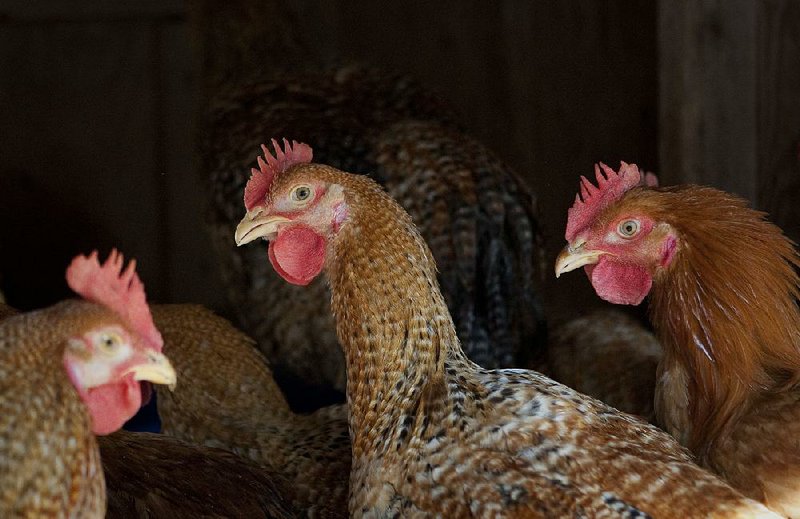Shares of U.S. chicken processors rose Monday after reports of a potential trade deal that would include a lifting of China's yearslong ban on imported U.S. poultry.
Since 2015, China has restricted U.S. imports of chicken, turkey and eggs over concerns about avian influenza, or bird flu.
But China is being pressured to reach a trade deal with the United States, and a hog disease, not dangerous to humans, has severely damaged Asia's swine herds in the past year.
Over the weekend, Reuters reported that U.S. and Chinese officials are closing in on a trade agreement after high-level telephone talks on Friday, with agriculture products being a major topic of conversation. The news agency reported that the U.S. will import Chinese-made cooked poultry and catfish products, while China will lift a catch-all ban on U.S. poultry products.
After the news, shares of Tyson Foods and competitors swelled Monday. Shares of Tyson rose 4.6%, or $3.60, to close at $82.08 on the New York Stock Exchange. Meanwhile, shares of Pilgrim's Pride rose 8%, or $2.30, to close at $30; and Sanderson Farms rocketed 16%, or $21.20, to close at $155.71.
A factor driving up share prices of chicken processors is their exposure to China's market. After China banned U.S. poultry, companies began selling chicken paws and feet, an overseas delicacy, to domestic rendering businesses that turn animal parts into oils and fats, said analyst Ben Bienvenu of Stephens Inc. U.S. companies had sold chicken feet for as much as $1 per pound to China, whereas the same feet sold to rendering plants fetch about 10 to 20 cents per pound.
If the ban is lifted, "that same product is 10 times more valuable," Bienvenu said.
"We are encouraged by the trade news from China and look forward to learning more details when a deal is finalized," Gary Mickelson, Tyson's director of media relations, said in an email Monday. "Until the 2015 ban on U.S. poultry, China was an important export market for our chicken and we're hopeful that business can be re-established."
In 2014, chicken paws and feet accounted for 30% of total chicken exports to China, Bienvenu wrote in a research brief, with the U.S. being a significant supplier. While signs of a lifted ban are a "clear positive" for Tyson and competitors, Bienvenu said Sanderson has the most foreseeable room for growth.
According to investor filings, Sanderson sold China 74.9 million pounds of chicken valued at $62.1 million in fiscal 2014. In fiscal 2015, before the ban took effect, Sanderson sold just 22.8 million pounds of chicken to China for about $20 million. By fiscal 2016, Sanderson reported no sales to China.
"What's been so significant about this ... is that it's the first time we've heard with clarity from China about lifting the ban on poultry, beforehand it's just been speculative," Bienvenu said.
According to the U.S. Department of Agriculture, a domestic bird flu outbreak resulted in the culling of 50 million chickens and turkeys between December 2014 and June 2015 to stop the spread of the disease.
Despite the outbreak affecting only egg-layers and turkeys, several countries implemented catch-all bans that prevented broiler chicken exports from reaching China, Japan, Mexico and other nations. According to the USDA, this resulted in higher egg and turkey prices at the time, while the value of broilers fell.
Asked about the status of the first phase of a possible trade deal with China, President Donald Trump said Monday that "we are looking probably to be ahead of schedule to sign."
Trump said he hopes to sign off on a first phase of the deal on the sidelines of a global summit in Santiago, Chile, next month. Because of recent violent protests and curfew restrictions, summit officials updated their website to say they are trying to move the event to Buenos Aires, Argentina.
This could end up being a banner year for chicken, cattle and pork, said Jason Apple, department chair and professor of animal science at Texas A&M University, Kingsville.
With Australia's supply dwindling because of droughts and other weather-related issues, "Brazil is about it" for China in terms of suppliers, Apple said. It doesn't help that China has lost more than half of its hog herds to African swine fever.
"They had to come back to the negotiating table at some point," Apple said, which can lead to a "windfall for all of us."
If a deal with China on chicken imports is reached, shoppers can expect to see higher retail prices by the first quarter, or as late as March, Apple said.
"I think this is some of the best news we've heard in a long time," he said.
Business on 10/29/2019
